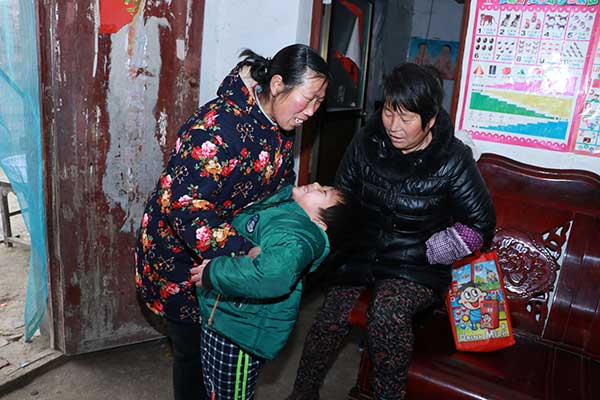Lonesome lives
By Satarupa Bhattacharjya in Fuyang, Anhui province ( China Daily ) Updated: 2017-01-14 07:18:30
 |
|
Song Jinlan (left) says she feels most desperate when her grandson (center) falls sick.[Photo by Zhu Lixin/China Daily] |
Her son sends her 1,000 yuan ($144) a month on average, Song says. In addition, she earns some money from selling corns and other crops that she grows.
In 2015, Fuyang's per capita rural dispensable income was 9,001 yuan on average a year.
Song's son and daughter-in-law come home every Chinese New Year and stay for less than two weeks.
This year the couple want to arrive ahead of the Spring Festival week to hold a ceremony to cut a few strands of long hair their son has been wearing since early childhood as a traditional symbol of good fortune. But so far, Song says, her son hasn't got the extra leave he desires.
"Without his parents around, I sometimes feel helpless, especially when the kid falls sick," she says pointing to her grandson, Zhou Junhao, aged 6.
In the town of Xihu, at some distance from Wuli village, former schoolteacher Du Fengcai and his wife have raised two grandsons in the past 20 years.
Du's son, a longtime migrant who now runs a hotel in the touristy city of Dali, in Southwest China's Yunnan province, can't take his 13-year-old younger child along because of their limited options for school education there, Du says. His older grandson, aged 22, has joined his parents' business in Dali.
Du urges a reform of the country's household registration system or hukou to increase the educational prospects of the children of migrant workers in host cities.
While the first nine years of education are compulsory in China, the existing hukou system throws some challenges at migrants.
The 2016 government survey makes a mention of the reform, too.
|
|
|
|
|
|
|
|

























 Raymond Zhou:
Raymond Zhou: Pauline D Loh:
Pauline D Loh: Hot Pot
Hot Pot Eco China
Eco China China Dream
China Dream China Face
China Face






